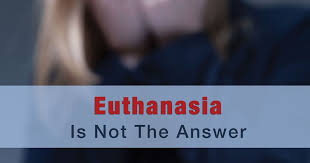Executive Director, Euthanasia Prevention Coalition
The issue of euthanasia is being debated in Britain, but what is interesting is how Canada's experience with euthanasia is affecting the British debate.
An article by Yuan Yi Zhu that was published by UnHerd.com on Monday August 22 challenged Matt Hancock, the former UK Health Minister, who recently stated that he supports euthanasia. Zhu points out that on the day Hancock announced his support for euthanasia, a story was published about a Canadian veteran with PTSD who was not asking for euthanasia, but was told by a Veterans Affairs officer that he should consider (MAiD) euthanasia. Zhu wrote:
On the very same day as Hancock’s declaration, it was reported in Canada that an injured veteran was casually asked if he wanted euthanasia when he was simply trying to obtain healthcare, without him ever having expressed an interest in ending his life. The week prior, the Associated Press reported cases where Canadian patients chose to die due to inadequate income support, and where disabled people who refused euthanasia were called “selfish” and accused of being a drain on resources, in one case by a hospital’s director of ethics.This is not the first time that the UK has focused on Canada's experience in their euthanasia debate. During the British parliamentary euthanasia debate last July, Dr Gordon Macdonald, from Care Not Killing reported:
Such reports have been legion ever since Canada legalised euthanasia in 2016, after its Supreme Court struck down the legal prohibition on assisted suicide because it infringed a constitutional right to life. Since then, many have chosen to die because, in the words of one who applied for it, they “simply cannot afford to keep on living”. Poverty itself is not a valid ground for euthanasia, but almost any chronic condition — including hearing loss in at least one case — can be. From 2023, mental illness will be a qualifying ground as well.
No doubt euthanasia’s proponents will dismiss Canada’s experience as an aberration and argue that it is possible to regulate away the moral hazards associated with the practice. The same argument was made by Canada’s judges, who brazenly dismissed the experience from the Netherlands, where children as young as 12 can now choose to die, and where a doctor was acquitted of murder even after admitting to euthanising an elderly woman despite her persistent protestations that she did not want to die.
“Some MPs rightly expressed concern at the mission creep we see in countries like Canada, which legalised so called ‘medical assistance in dying’ in 2015. The law was originally limited to those whose natural deaths were ‘reasonably foreseeable’, but in September 2019 the Quebec Superior Court struck down that restriction. This followed the case of Alan Nichols, a former school caretaker who was physically healthy, but struggled with depression. His life was ended by lethal injection in July 2019. That same year also saw the chilling case of Roger Foley, who was repeatedly offered the drugs to kill himself, while being denied the social care to live a dignified life, due to the cost.Canada's out-of-control euthanasia law is at least causing some jurisdictions to hesitate in following Canada's path. Too bad Australia already has followed Canada's lead.


No comments:
Post a Comment